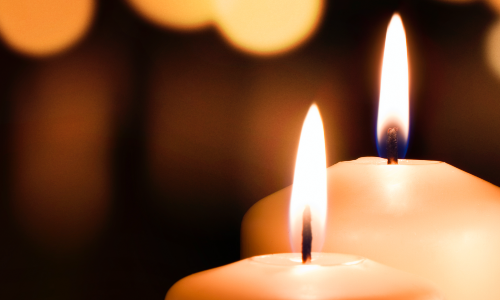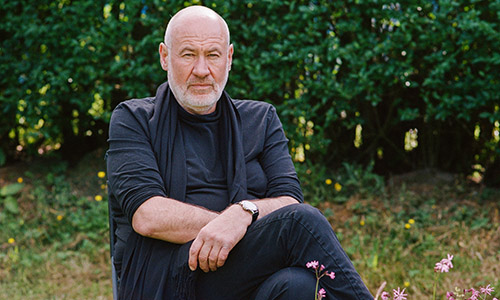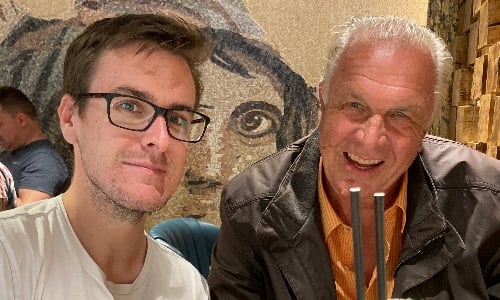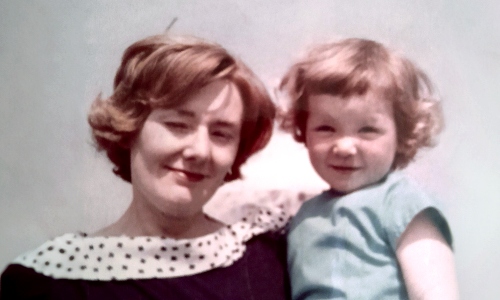Having served as a reporter for BBC Radio Manchester, David Hulme was used to chronicling the lives of other people. Little did he know, however, that he’d receive news that would lead him on a journey filling in the blanks of his own life story.
In 1991, during a visit to a friend of his late grandmother, David received the life-changing news that his biological father was not that man he’d grown up believing it was, but actually an American soldier. The revelation led David, now 76, on an epic search, initially full of disappointments but eventually answers and affirmation, teaching us it’s never too late for new chapters.
Tell us about Harriet Bluff, the woman who changed the course of your life...
David: “She’d been my grandmother’s closest friend throughout their lives. One day, my wife Ann and I were sitting in her tiny flat in the Reddish area of Stockport, having a cup of tea. By now she was in her late 80s but still living alone and caring for herself. My grandmother, her lifelong friend, had died at the relatively early age of 54, so Mrs Bluff was the nearest person we had to a grandmother in the family.”
How did she tell you the news?
“Right out of the blue, without any preamble, Harriet suddenly said: ‘Your father was an American soldier. His name was John Bell and he came from Texas.’ Up until that moment, I believed my father was Walter Hulme. His name is on my birth certificate and it is the surname I carry to this day. I’ve still no idea why Mrs Bluff decided to reveal this fact to me but I owe her a great debt.”

The revelation that I had an American father was a complete shock.
What were the emotions you went through following this discovery?
“The revelation that I had an American father was a complete shock. Walter Hulme, the man I thought was my father, was still living in Stockport and I could have gone to see him at any time as I was growing up. I never did, much to my regret. He’d walked out soon after marrying my mother in late 1944 when she was already heavily pregnant with me. He’d discovered that he wasn’t my father – a secret kept from me, of course.”
“Walter was made out to be the bad guy, the family deserter, leaving me to be born into poor circumstances and brought up by a single mother. Before the age of three I was put into care for a short time while my mother tried to start a new life with a man living in Dagenham. That failed, and so I was eventually brought up by my single mother in Stockport. It was a lonely and insecure childhood, and my earliest memories of being in care haunt me more now than at any other period of my life.”
“So, knowing I had an American father, I faced my mother. It was a tense relationship – and all I got were tears and no useful information as to who my father was, apart from her confirming his name and the state he came from.”
Describe the process and the challenges involved
“The vital information that was lacking was my father’s military details. It was obvious from my early inquiries that this was key to getting any records. But GI Trace, which helps people trying to trace American GI family members, had warned me that in 1973 there had been a disastrous fire at the National Personnel Records Center in St. Louis, Missouri, in which nearly all their military records, on paper, with no back-up and pre-computer, had been reduced to ashes. Army records from around 1912 to the late 50s were destroyed."
“But there was an even bigger obstacle in my way, and one I didn’t even know about until 2016 – my father had used a false name at the time of his brief affair with my mother. Even if I’d had the correct name and state, the chances are those details would have gone up in flames. I gave up my search many times – it just seemed hopeless. I was beginning to believe that I would go to my grave without ever finding out who my real father was.”
“In 2015, I contacted the NPRC again in St. Louis. I got a reply from one of their senior archivists, Dr Neils J Zussblatt. Over the years they’d built up records from all kinds of government sources following the fire, and so I received a list of around 100 John Bells, all men who’d served in the US army in wartime. But I couldn’t connect any of them to the UK in 1944. At around the same time, I managed to get the services of a military researcher in the USA who agreed to work for me pro bono. But her search also proved fruitless. I’ll always remain thankful to Dr Zussblatt and that military researcher for trying to help me.”
How did the breakthrough come about?
“I’d now been trying to identify my father, off and on, for nearly 25 years. Around 2014, I began seeing newspaper reports about people tracing family members through DNA testing. I thought I would try it. If this didn’t work, I thought, then I would definitely give up my search. These tests were becoming affordable, and luckily for me, more people were testing in North America than in Europe, so I believed that would improve my chances of success.”
“I contacted GI Trace in 2015 and the genealogists there told me to take an autosomal test, what they call a ‘family finder’ test. They advised me to take more than one test, to spread the net wide. I decided to take the tests sequentially. I chose Ancestry and sent off a saliva sample to their laboratory in Dublin. A few weeks later the result came back – and I got my first breakthrough: a second cousin had tested. The name they were using on the Ancestry site was ‘JVerne2’. I tried to find out more by visiting JVerne2’s family tree but it was private. I also sent a message through the Ancestry system but got no reply.”

I was buzzing with the knowledge I had established a genetic link but couldn’t get any further forward.
It must have been frustrating to have got that far and then hit another barrier?
“It really was. I was buzzing with the knowledge I had established a genetic link but couldn’t get any further forward. I contacted the genealogists at GI Trace who got to work, telling me that finding a second cousin was gold dust. Weeks later they got back to me. They didn’t share their methods and I never asked, but they confirmed that JVerne2 was a woman living in the USA and that she belonged to the extensive Edwards family of Michigan, centred in Detroit.”
“This was the moment when I finally knew my American family name, proof that I really did have an American father. But what about the name John Bell? The genealogists told me it was common among soldiers in warfare to use false names to protect themselves in any personal relationships. It would appear that my father had used a false name, too. But I still didn’t know who he was.”
What happened next?
“The genealogists told me there were seven brothers and three sisters in the Edwards family, all by now dead. But among them would be my father. This was exhilarating stuff after all those barren years of searching. Five of the brothers were eliminated from consideration because they were either too old to have seen war service, one had died young in a drowning accident, and the youngest brother had been in the navy but never travelled to England. There were just two brothers left to check out.”
“But unfortunately the brother chosen as my possible father – James John Edwards – turned out to be my uncle. He was the one closest in age to my mother – the reason he was chosen for checking – and military records obtained from the NPRC by the genealogists showed he had served as an army telephone engineer in England in 1944. The genealogists were saying this could be my father. I tracked down two of his sons, one in Detroit, the other in Colorado, and introduced myself as a possible half-brother.”
“We spent the summer of 2016 emailing each other – until the younger one took his own DNA test. This showed we were actually first cousins, not half-brothers. It was deeply embarrassing and depressing. I apologised to them both and they were quite gracious about the whole thing. But it meant I had to start searching again. By this time there was only one brother left – Allan Russell Edwards. This had to be my father, surely?”
“More military records arrived and it showed Allan Russell Edwards had served in the 837th Ordnance Depot Company, an ammunition supply unit that was part of Patton’s Third Army. My own list of all US military units stationed in Stockport in 1944 showed that the 837th were stationed in Stockport during May and June that year, the period when my mother became pregnant with me. Putting that military information next to the strong genetic links with the Edwards family, I had found my father at long last.”
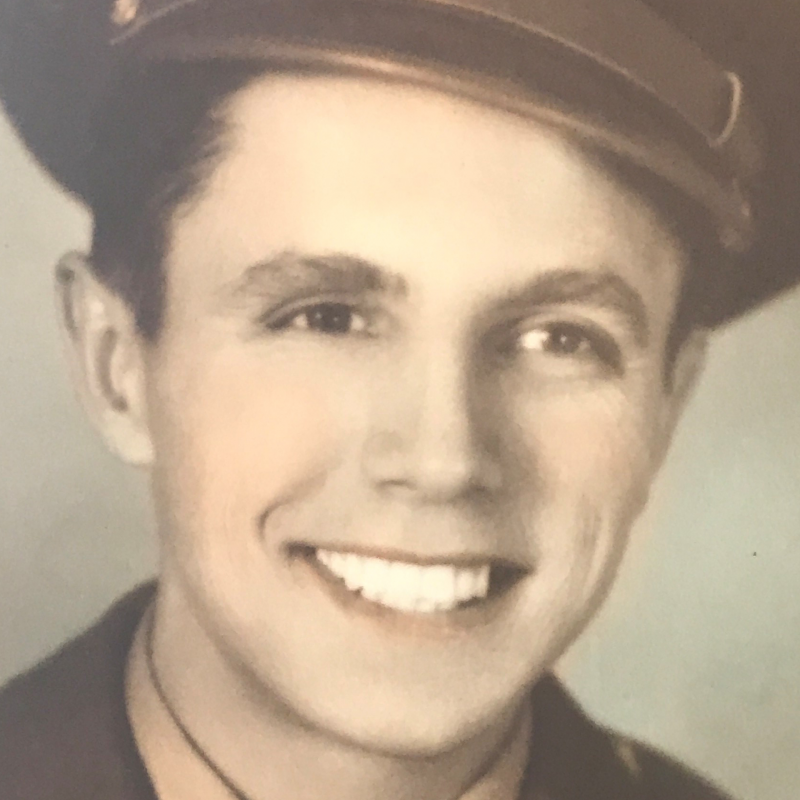
David's father, Allan Russell Edwards.
What did you find out about your father?
“To explain what I found out about my father, I should explain first that I identified my half-sister, who was able to tell me so much. Some time earlier, when I’d first found I belonged to the Edwards family, I’d come across the name Allan Russell Edwards. I was writing to people in Michigan hoping they might be cousins and so on. But when I found contact details for Allan Russell Edwards and wrote to him, I got no reply. I even wrote to his son and got no response there either. Now I contacted one of my first cousins, one of the men I had thought was a half-brother originally.”
“He confirmed that Allan Russell Edwards was my father’s son, born four years after me and given the same name as our father.. He agreed to contact Russ, as he was known, to see if he now wanted to make contact. A few weeks later came the bad news – no, Russ still didn’t want to get in touch. But the good news was that I had a half-sister living in northern Michigan called Judy Clough. She’s a great lady, I was told, and she’ll be very willing to talk to you. So I wrote to Judy late in 2016 and we’ve been writing and phoning each other ever since.”

I’ve often wondered where this ability with words came from... this ability really was in the genes.
So what did Judy tell you about your father?
“Judy explained that a few years after his war service, my dad had developed MS and became increasingly ill as time went by. He died in 1964, just short of his 44th birthday, paralysed in a hospital bed and hardly able to talk. So there was never any chance of us meeting. But she told me how he used to sell real estate when he was younger and still well enough. Judy would sometimes go along to help him. He had the gift of the gab and was known for his honesty.”
“Among all the details, Judy told me something that was very emotional for me. You see, I’ve been a poet for much of my life and my son is a prolific poet, too. I’ve often wondered where this ability with words came from. Judy told me my dad loved to read poetry and sometimes wrote poetry, especially in letters home. And his older brother, Dale, was his high school poet laureate and met his future wife in a creative writing class. So this ability really was in the genes.”
So how has this information changed your life and outlook?
“I’m fortunate enough to have a good and loving family around me. I put great store by family life. I think as you get older you appreciate this even more. But knowing who my father was has filled a great hole in my life, it was a part of me that was always missing and now I’m complete.”
“I’ve always been an internationalist in outlook, so knowing that I have American family, that I’m half-American, chimes with my worldview. Also, through Ancestry and another genealogy website, I’ve now discovered that I have thousands of cousins from first to fourth. Most of them are in the USA, but I’ve even found cousins I didn’t know I had in my home town of Stockport. I’m now in touch with my newly-found cousins in the US and here at home.”
“What I’ve discovered is really surprising – a Swedish ancestor captured by pirates in the Baltic, kept prisoner for years, and who jumped ship off Boston and swam to shore; another cousin who claims descent from John Rolfe and Pocahontas; yet another whose daughter is a successful writer of fantasy novels. But the biggest surprise of all came through my own research of the Edwards family. Starting with the granddaughter of my Swedish ancestor – Alma J Lowell – I traced our ancestry all the way back to the Mayflower. We are descended from Stephen Hopkins and Pilgrim Thomas Rogers. That was the icing on the cake.”



